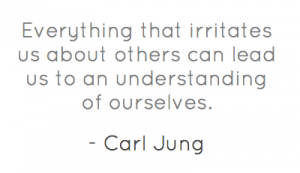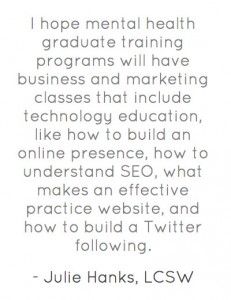 Guest post by Kimberly Sandstrom, MFTI
Guest post by Kimberly Sandstrom, MFTI
We all have days where we need to let out a little steam about a difficult day at work. Social media is not the place to do it.
In the first post on this topic, my goal was to bring awareness to our community about the hazards of posting personally about clients. Although our clients may not see our personal posts (see Julie Hanks Digital Dual Relationship Dilemmas), our own personal communities will, and our reputation is built on that community.
While my personal profiles are private, my extended friendship community and family I am connected with on these sites, trust me and my ability to keep things confidential for their referrals What I portray on my personal and professional sites will reflect the reputation I have as a therapist.
Does this mean we cannot post anything at all about the work we do on our personal accounts? Certainly not! My heart is for fostering a safe environment for consumers so they will feel comfortable sharing with us in the intimate space of our offices, and assurance that their stories will be kept contained within the walls of our office. Here are some tips to protecting not only yourself but our therapeutic community at large when posting about your therapeutic work.
Think before you post
Ask yourself these questions: If my client saw this, would they like what I posted about them? Is this fostering a positive message about my therapeutic community? What are my motives for posting this (i.e., vent frustration, draw others to me through humor, etc.)? Am I venting my frustration in a way that protects my client and my reputation? Would it be better if I shared this with another colleague privately?
Keep your posts about work general and positive
After a recent couples intensive weekend, my co-facilitator and I were so blessed to see the positive transformation in the couples that attended our workshop. It inspired us. I posted on my personal Facebook profile, “So blessed to watch couples transform their relationships over this weekend at the couples retreat. I love my job!” Nothing specific about what conversations took place. If one of the participants to read this, it would most likely reflect their own positive experience of the weekend. Occasionally, I have asked for permission from clients to share their inspiring story or something they have written (poem, inspiring reflection) in a blog or to post on my professional social media sites, and again, I keep the information general and positive. And I make sure it is in a place they can see this posted (even though I do not accept former or current clients on these sites—they are open to the public to view).
Develop safe relationships with like-minded colleagues in your own community
We all have funny and frustrating stories from work—no matter what profession we are in. Developing relationships with other therapists in your community can provide you with a group that follows the same values of confidentiality that you do. You can vent your day to them, share funny stories (without giving identifying information about your clients, of course!), and explore your own triggers and countertransference in confidence, instead of publicly.
Have grace with fellow clinicians who may violate this gray area
If you feel inclined, send them a private message with your concerns about their post. If it is done with a spirit of helpfulness, gentleness, and affirms their good intention, they will most likely be grateful. If, after reading this, you realize that you may have posted something about a client that qualifies as negative or comical, have mercy on yourself! We are human, fallible and worthy of lots of grace in the uncharted territory of social media etiquette!
 Kimberly Sandstrom is a Marriage & Family Therapist Intern and Relationship Educator, Supervised by Kathryn de Bruin, LMFT, working in private practice in San Diego, CA. Married for 24 years, she and her husband are raising three daughters, two of whom are now adults. She works with couples, and families to create emotionally safe and enduring connections in their most cherished relationships.
Kimberly Sandstrom is a Marriage & Family Therapist Intern and Relationship Educator, Supervised by Kathryn de Bruin, LMFT, working in private practice in San Diego, CA. Married for 24 years, she and her husband are raising three daughters, two of whom are now adults. She works with couples, and families to create emotionally safe and enduring connections in their most cherished relationships.
social media image (c) CanStockPhoto






 You're in the mental health field because you want to make a difference and make a living, right? Technology and new media now allow therapists to educate and interact with worldwide audience and to talk directly to
You're in the mental health field because you want to make a difference and make a living, right? Technology and new media now allow therapists to educate and interact with worldwide audience and to talk directly to 
As healers, we genuinely like to do our work. Guiding clients through the therapy process and seeing them make progress is why we do what we do. But if you're in private practice, you know there's a lot going on in the back end and that it's crucial to run an efficient and organized business.